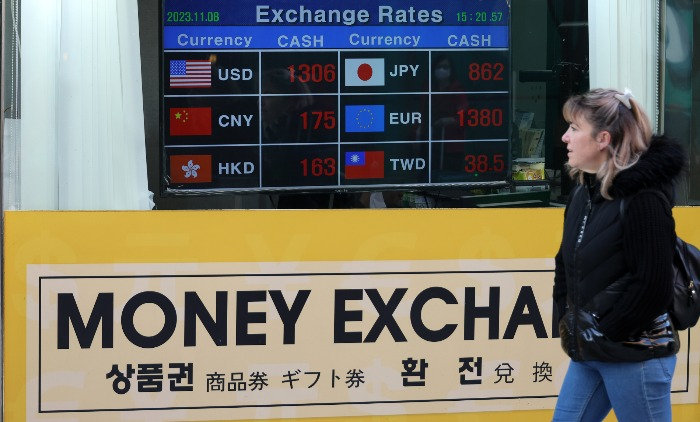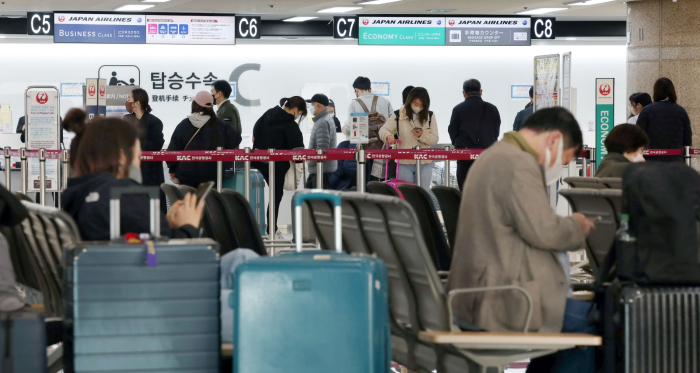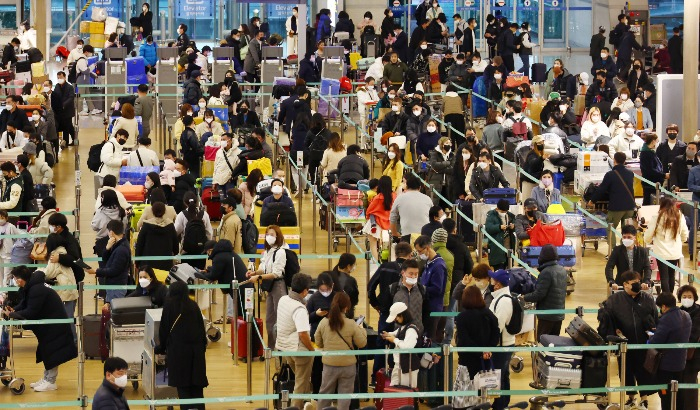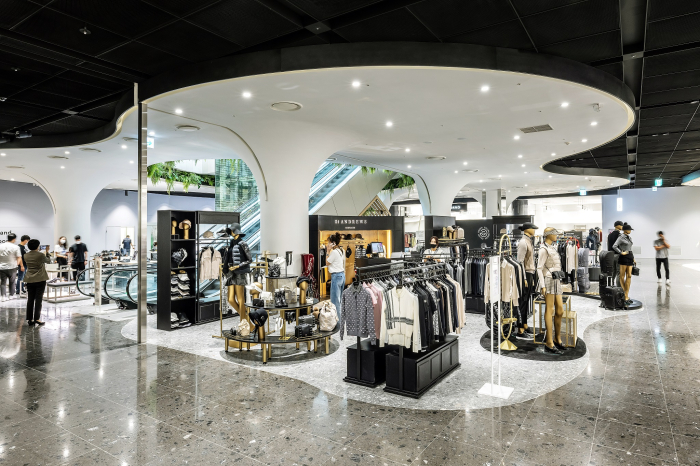Retail
South Koreans, frugal at home, open wallets abroad
The weaker Japanese yen makes the cost of shopping and travel lower in Japan than in Korea
By Nov 09, 2023 (Gmt+09:00)
2
Min read
Most Read
LG Chem to sell water filter business to Glenwood PE for $692 million


Kyobo Life poised to buy Japan’s SBI Group-owned savings bank


KT&G eyes overseas M&A after rejecting activist fund's offer


StockX in merger talks with Naver’s online reseller Kream


Mirae Asset to be named Korea Post’s core real estate fund operator



Consumer spending in South Korea has been on the decline this year amid few signs of a near-term recovery. But when it comes to overseas spending, it’s a different story.
In the first half of this year, South Korean residents spent a total of 12.36 trillion won ($9.4 billion) abroad mainly on food, clothing, accommodation and transportation, data from the Bank of Korea show. A big chunk of them is believed to have been spent in Japan.
The figure is equivalent to the 14.2 trillion won of the first emergency disaster relief fund distributed by the South Korean government between May and August 2020 to stimulate domestic consumption.
The number of passengers who took flights to Japan in South Korea totaled 16 million between October last year and September this year.
The weaker yen, staying at its 15-year low to the won, makes it cheaper to shop in Japan, even including airplane ticket prices, compared to the expenses to travel and shop in Korea.
Further, the lifting of COVID-19 travel restrictions by Japan and the resumption of visa-free entry for South Koreans in October last year fanned the demand for trips to the neighboring country.

“The current won/yen exchange rate is very attractive for (Korean) consumers to purchase Japanese goods or services,” said Joo Won, a senior researcher at the Hyundai Research Institute. “This is an unusual situation, so it is likely to have affected consumer behavior.”
CONSUMER SENTIMENT
By contrast, South Korea’s consumer sentiment index (CSI) stayed below 100. That means a greater number of consumers have a negative economic outlook than those with an optimistic view.
The CSI, compiled by the Bank of Korea, fell 1.6 percentage points to 98.1 in October, versus 99.7% the month prior.
Economists say consumer spending in South Korea will remain sluggish until at least the first half of next year due to high interest rates and stubborn inflation.

SELF-EMPLOYED
Amid an economic slowdown, the self-employed accounted for 19.96% of the total number of those with jobs in September this year, according to Statistics Korea.
It is the third time so far this year that their proportion fell below 20% after February and March.
Even during the pandemic period, the proportion of self-employed remained at the 20% level.

DEPARTMENT STORES
The sharp rebound in overseas travel dealt a direct blow to Korean department stores. They suffered their first negative sales growth this year since the COVID-19 outbreak in early 2020.
Shinsegae Inc., the operator of Shinsegae Department Store, on Wednesday reported a 0.9% dip to 604.2 billion won ($461 million) in third-quarter sales from the same period last year.
Write to Hung-Hyoung Ha and Mi-Kyoung Lee at hhh@hankyung.com
Yeonhee Kim edited this article.
More to Read
-
 RetailShinsegae, Galleria woo Louis Vuitton, Rolex for new growth
RetailShinsegae, Galleria woo Louis Vuitton, Rolex for new growthNov 08, 2023 (Gmt+09:00)
2 Min read -
 Foreign exchangeWon strengthens past 1,300 mark vs dollar on short-sale ban
Foreign exchangeWon strengthens past 1,300 mark vs dollar on short-sale banNov 06, 2023 (Gmt+09:00)
2 Min read -
 Foreign exchangeYen hits 15-year low vs Korean won on less hawkish BOJ
Foreign exchangeYen hits 15-year low vs Korean won on less hawkish BOJNov 03, 2023 (Gmt+09:00)
1 Min read -
 Executive reshufflesShinsegae axes E-Mart, department store CEOs amid weak sales
Executive reshufflesShinsegae axes E-Mart, department store CEOs amid weak salesSep 20, 2023 (Gmt+09:00)
3 Min read -
 Travel & LeisureS.Korea's No. 1 flight route in 2023 is Incheon-Osaka
Travel & LeisureS.Korea's No. 1 flight route in 2023 is Incheon-OsakaAug 07, 2023 (Gmt+09:00)
2 Min read -

-

Comment 0
LOG IN


